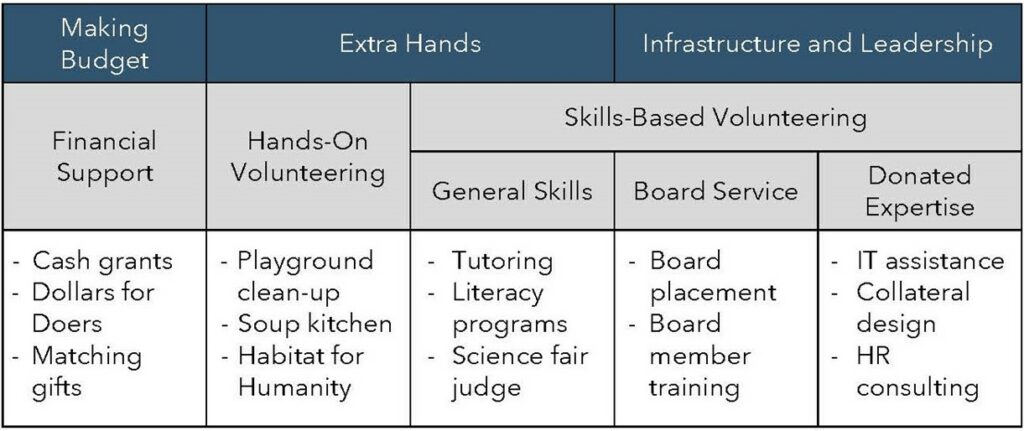
When you think of volunteering, images of cleaning up your local park or working in a food pantry may come to mind. While hands-on volunteering is critical to fulfilling many nonprofits’ missions, other forms of support can help organizations as well. Most nonprofits don’t have access to the resources, funding, or qualified talent to function effectively, but a donation of professional expertise can help organizations fill those gaps. Donating one’s professional expertise is called skilled or skills-based volunteering.
Skilled volunteering involves sharing talent and experience with social change organizations. A nonprofit might need help designing its website but doesn’t have the staff, time, or money to do so. A professional website designer could take on those tasks to support the cause, applying knowledge gained on the job to support a cause they believe in.
How is skills-based volunteering different than traditional volunteering?
Volunteering comes in many forms. The table below show common ways that nonprofits receive support.

The dark blue row above show a simplified categorization of nonprofit needs. Making budget includes monetary funding used to run the organization. Extra hands are people who deliver services and programs directly to the community, such as helping paint a wall or tutoring students in an after-school program. Infrastructure and leadership includes people and resources that build a strong strategic foundation for the organization, like HR, tech, finance, and marketing consultants.
Skills-based volunteering can fall under both “extra hands” and “infrastructure and leadership,” since the volunteer shares their professional expertise to build, enhance, and expand an organization’s ability to serve their community. A skilled volunteer focuses on addressing an organization’s internal strategic and infrastructure needs (often referred to as capacity building). For example, an HR professional could engage in traditional volunteer opportunity by planting a community garden, but could also provide their professional services by helping an organization draft an employee handbook for free.
![]() How does skilled volunteering benefit social good organizations?
How does skilled volunteering benefit social good organizations?
Donating one’s professional knowledge can truly make a difference to a nonprofit’s bottom line. Taproot’s Pro Bono Valuation calculates the monetary value of an hour of skilled volunteering in areas like finance, marketing, strategic planning, and HR. On average, one hour of skills-based volunteering is worth $220! But the value goes beyond just monetary support: 92% of nonprofits report that skilled volunteers are a strong resource to build capacity.
![]() What are the benefits to volunteers?
What are the benefits to volunteers?
Skills-based volunteering offers a different kind of volunteering opportunity for business professionals. Here are just a handful of benefits:
- Donate your time and talents to causes you care about
- Learn about social issues and the challenges impacting your community
- Grow your network
- Make a difference in your community
- Boost your career by strengthening skills, branching into the nonprofit sector, and gaining leadership experience. Don’t forget to add the experience to your resume!
 Taproot supports skilled volunteers and social good organizations
Taproot supports skilled volunteers and social good organizations
Taproot created our free online volunteer matching platform, Taproot Plus, which connects skilled volunteers and nonprofits to drive social impact. A nonprofit can request support from a volunteer for a multi-week Project or one-hour consultation Session, and volunteers can find an opportunity that matches their skill set with a cause they believe in.
If you’re a nonprofit looking for solutions to solving organizational challenges OR you’re a business professional searching for a way to give back, Taproot provides the perfect solution. Sign up now on Taproot Plus to become or find a skilled volunteer!
![]() Skills-based volunteering works for corporate and philanthropic partners, too!
Skills-based volunteering works for corporate and philanthropic partners, too!
Taproot has worked with over 100 Fortune 500 companies to develop custom skilled volunteering programs to fulfill their corporate citizenship and employee engagement goals. Your company can provide vital nonprofit support, leverage employees’ talents, and give back to communities. Your employees can reap the same benefits as any skilled volunteer, but they can also collaborate with a group of colleagues to support nonprofits together. Read more about skills-based volunteering programs for your company.
We also collaborate with philanthropic partners to deliver skilled volunteering programs and access to Taproot Plus for your grantees. Taproot programming multiplies the capacity-strengthening investments made by grant-making organizations. Learn how Taproot works with our philanthropic partners to strengthen our communities.
Taproot is here to welcome you to the world of skills-based volunteering!

